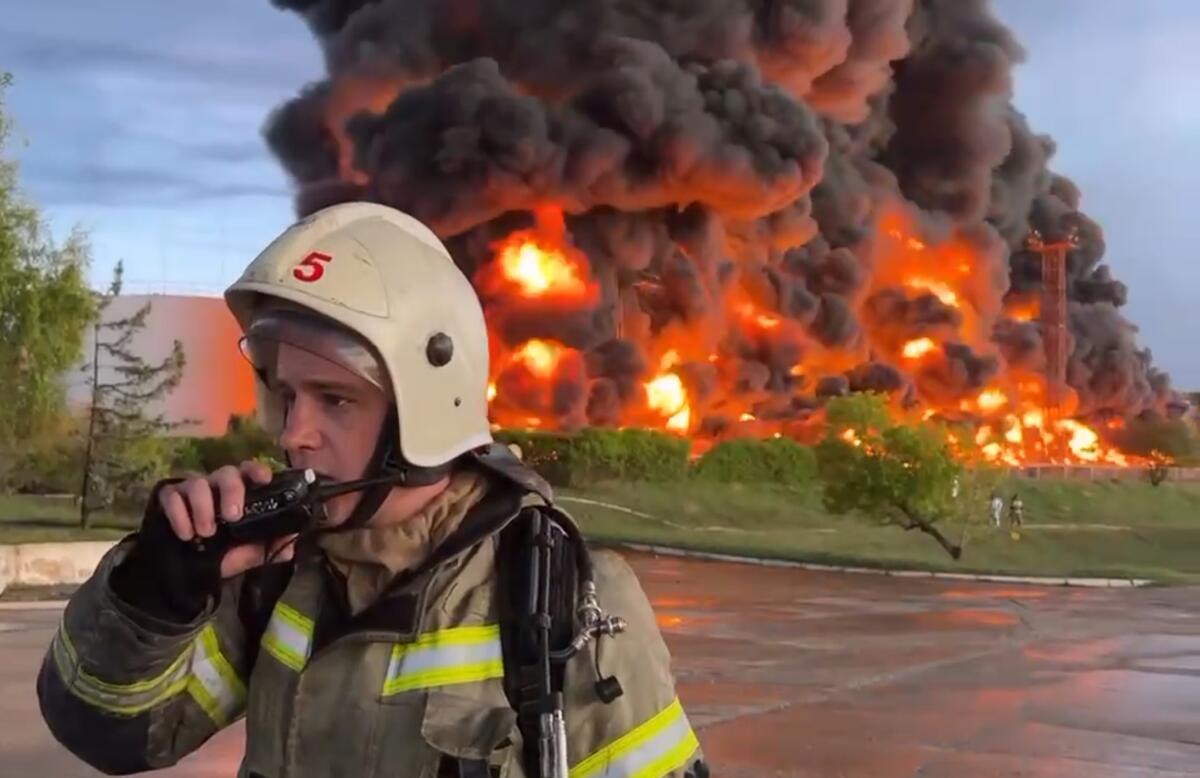Oil depot is struck in Crimea; Russia blames Ukrainian drone

- Share via
KYIV, Ukraine — A massive fire erupted at an oil depot in Russian-occupied Crimea after it was hit by two of Ukraine’s drones, a Kremlin-appointed official there reported Saturday, the latest in a series of attacks on the peninsula as Moscow braces for an expected Ukrainian counteroffensive.
Mikhail Razvozhayev, the Moscow-installed head of Sevastopol, a port city in Crimea, posted videos and photos of the blaze on his Telegram channel.
Razvozhayev said the fire at the city’s harbor was assigned the highest ranking in terms of how complicated it will be to extinguish. However, he reported that the open blaze had been contained.
The oil depot was attacked by “two enemy drones,” and four oil tanks burned down, Razvozhayev said. A third drone was shot down, and one more was deactivated through radio-electronic means, according to Crimea’s Moscow-appointed governor, Sergei Aksyonov.
Russia annexed Crimea from Ukraine in 2014, a move that most of the world considered illegal. Ukrainian President Volodymyr Zelensky said in an interview last week that his country will be seeking to reclaim the peninsula in the upcoming counteroffensive.
Russian President Vladimir Putin traveled to Crimea last month to mark the ninth anniversary of the Black Sea peninsula’s annexation from Ukraine. Putin’s visit took place the day after the International Criminal Court issued an arrest warrant for the Russian leader accusing him of war crimes.
The attack reported in Sevastopol comes a day after Russia fired more than 20 cruise missiles and two drones at Ukraine, killing at least 23 people. Almost all of the victims died when two missiles slammed into an apartment building in the city of Uman in central Ukraine, about 135 miles south of Kyiv.
Russian private military contractor Wagner is busy boosting its brand as its fighters try to subdue Ukraine, trading secrecy for war propaganda movies.
Six children were among the dead, Ukrainian Interior Minister Ihor Klymenko said Saturday, adding that 22 of the 23 bodies recovered have been identified. Two women remained missing, Klymenko said.
Russian forces launched more drones at Ukraine overnight. Ukraine’s Air Force Command said two Iranian-made self-exploding Shahed drones were intercepted, and a reconnaissance drone was shot down Saturday morning.
Razvozhayev said the oil depot fire did not cause any casualties and would not hinder fuel supplies in Sevastopol. The city has been subject to regular attack attempts with drones, especially in recent weeks.
Earlier last week, Razvozhayev reported that the Russian military destroyed a Ukrainian sea drone that attempted to attack the harbor and another one blew up, shattering windows in several apartment buildings, but not inflicting any other damage.
Ukraine’s military intelligence spokesperson, Andriy Yusov, told the RBC Ukraine news site Saturday that the oil depot fire was “God’s punishment” for “the murdered civilians in Uman, including five children.”
He said that more than 10 tanks containing oil products for Russia’s Black Sea fleet were destroyed in Sevastopol, but stopped short of acknowledging Ukraine’s responsibility for a drone attack. The difference between the number of tanks Yusov and Razvozhayev gave could not be immediately reconciled.
After previous attacks on Crimea, Kyiv also wouldn’t openly claim responsibility, but emphasized that the country had the right to strike any target in response to Russian aggression.
Elsewhere, Ukrainian forces shelled the city of Nova Kakhovka, according to Moscow-installed authorities in the Russian-occupied part of southern Ukraine’s Kherson province. “Severe artillery fire” cut off power in the city, the officials said.
The Ukrainian-controlled part of the province also came under fire Saturday. Russian shelling in the area of the village of Bilozerka killed one person and wounded another, according to the Kherson prosecutor’s office.
More to Read
Sign up for Essential California
The most important California stories and recommendations in your inbox every morning.
You may occasionally receive promotional content from the Los Angeles Times.











